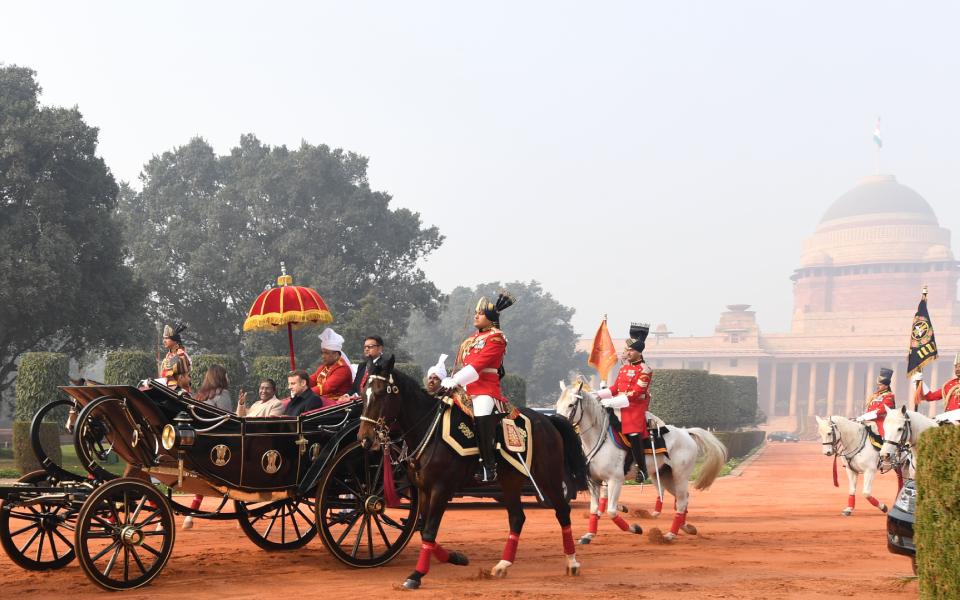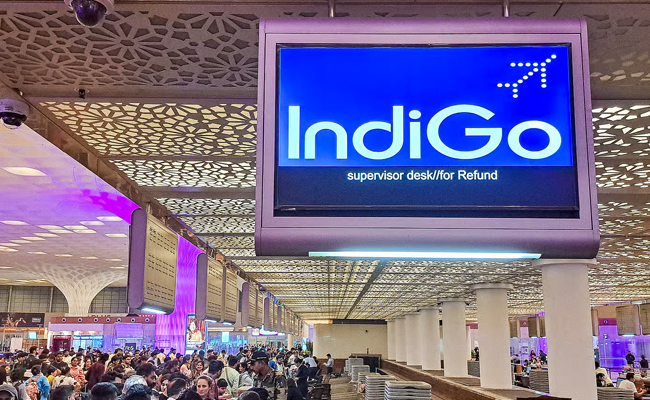New Delhi, Jan 26: Reviving a 250-year-old tradition on the 75th Republic Day, President Droupadi Murmu and her French counterpart Emmanual Macron arrived on Kartavya Path in a traditional buggy, which made a comeback after 40 years.
They were escorted by the President's Bodyguard -- "Rashtrapati Ke Angrakshak". The President's Bodyguard is the senior-most regiment of the Indian Army.
This Republic Day is special for this elite regiment, with the "Angrakshak" completing 250 years of service since its raising in 1773, and for India's old tradition where Murmu let go of the modern sedan in favour of the quaint horse-drawn buggy.
"President Droupadi Murmu and the French President Emmanuel Macron arrived at the Kartavya Path in the traditional buggy which made a comeback after 40 years," the Rashtrapati Bhawan said in a post on X.
The gold-plated, horse-drawn buggy is a black carriage with the national emblem embossed in gold. The buggy, drawn by a mixed breed of Indian and Austrian horses, has gold-plated rims.
The presidential buggy was in use for Republic Day functions till 1984 but was discontinued after the assassination of the-then prime minister Indira Gandhi.
The buggy was last used by Giani Zail Singh in 1984. It was discontinued due to security reasons and presidents began using limousines for travel.
It was only in 2014 when former president Pranab Mukherjee used it again for the beating retreat ceremony. His successor Ram Nath Kovind continued the tradition of riding the buggy. He inspected the Guard of Honour in the presidential buggy after taking oath in 2017.
During the British era, the buggy belonged to the Viceroy of India. After India's independence in 1947, a row erupted between India and Pakistan regarding claims over the carriage.
With no immediate solution and higher authority to decide on the row, India's then Lt Colonel Thakur Govind Sing and the Pakistan Army's Sahabzada Yaqub Khan took full responsibility for the fact that the ownership of the buggy would depend on a coin toss.
India is believed to have won the toss and the buggy has been with the country since then. The same carriage has been used by several presidents on various occasions.
Almost three decades ago, former president Fakhruddin Ali Ahmed used the buggy to reach the exit gate of the Rashtrapati Bhavan from where he took a car to attend the Republic Day ceremony.
The carriage was also used by presidents to pay homage at the Amar Jawan Jyoti during Republic Day celebrations. Besides, the heads of the country used the buggy to move around in their 320-acre residential space.
The 75th Republic Day Parade showcased the nation’s extraordinary Nari Shakti as impressive march-pasts by women received standing ovation by the invitees. President Droupadi Murmu and the French President Emmanuel Macron arrived at the Kartavya Path in the traditional buggy… pic.twitter.com/y2wE0VTxOu
— President of India (@rashtrapatibhvn) January 26, 2024
#WATCH Live | President Droupadi Murmu and French President @EmmanuelMacron leave for the Kartavya Path, in a special 'Traditional Buggy' or the presidential carriage. #RepublicDay #EmmanuelMacron #RepublicDay2024 #75thRepublicDay pic.twitter.com/jExQl6wOo4
— DD India (@DDIndialive) January 26, 2024
After almost 40 yrs, a traditional horse-drawn buggy on Kartavaya Path!
— The Times Of India (@timesofindia) January 26, 2024
President #DroupadiMurmu and French President #EmmanuelMacron depart in the buggy, accompanied by men in red uniforms on majestic horses. This practice was discontinued in 1984 makes a comeback after 40 yrs pic.twitter.com/mVq4rmMukp
Let the Truth be known. If you read VB and like VB, please be a VB Supporter and Help us deliver the Truth to one and all.
Bengaluru (PTI): The Karnataka government has issued directions to municipal corporations across the state to regulate and prohibit feeding pigeons in public places, citing serious public health concerns.
Deputy Secretary to Government V Lakshmikanth has written to the Urban Development Department requesting it to issue directions to the Greater Bengaluru Authority (GBA) and all municipal corporations to take immediate steps to implement the measures.
In an official note dated December 16 issued by the Health and Family Welfare Department and released to the media on Wednesday, the department said uncontrolled feeding of pigeons in public places has resulted in large congregations of birds, excessive droppings and serious health concerns, particularly respiratory illnesses linked to prolonged exposure to pigeon droppings and feathers such as hypersensitivity pneumonitis and other lung diseases.
ALSO READ: Chinese GPS tracker found on seagull near Karwar Coast
"The commissioner, the Greater Bengaluru Authority and the Commissioners and chief officers of other municipal corporations shall take necessary action to mitigate the causes of dangerous disease spread by pigeon and enforce specified guidelines in their respective jurisdiction," the note said.
According to the department, these include a prohibition on feeding pigeons or causing pigeons to be fed in areas where it may cause nuisance or pose a health hazard to the public. Pigeon feeding shall be permitted only in designated areas in a controlled manner, subject to certain conditions.
"The designated areas may be selected in consultation with stakeholders. The responsibility for upkeep of the designated areas and compliance to the directions shall be taken up by some charitable organisation or an NGO. The feeding in designated areas shall be permitted only for some limited hours in the day," it said.
The note further stated that authorised officers of local authorities shall issue on-the-spot warnings and may impose fines for violation of the order, or lodge complaints to prosecute offenders under Sections 271 (Negligent act likely to spread infection of disease dangerous to life) and 272 (Malignant act likely to spread infection of disease dangerous to life) of the Bharatiya Nyaya Sanhita.
It also directed local authorities to conduct public awareness campaigns, including the display of signboards, banners and digital messages, explaining the health hazards associated with pigeon droppings and feathers, the content of the regulatory directions and penalties for violations, and alternative humane methods of bird conservation that do not endanger public health.





